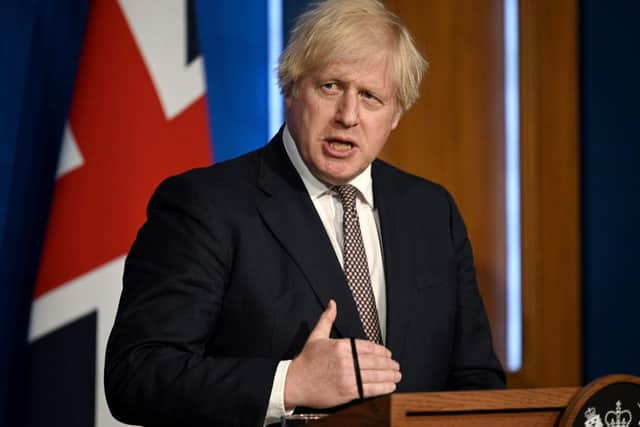Boris Johnson rejects £20 uplift to Universal Credit, saying ‘the answer is to get people into work’
and live on Freeview channel 276
Boris Johnson confirmed the end of the £20 a week uplift to Universal Credit before the Liaison Committee today (July 7), saying the government would rather choose “higher paid jobs” over “more welfare”.
The uplift was introduced during the pandemic and will be withdrawn at the end of September 2021, as planned, in spite of opposition from charities and cross-party groups.
Advertisement
Hide AdAdvertisement
Hide AdWe want to hear from you: let us know what you think about this story and be part of the debate in our comments section below


At a glance: 5 key points
-The £20 uplift to Universal Credit was initially introduced as a one-year measure in March 2020 to help families whose finances were hit by the coronavirus pandemic.
-The work and pensions minister, Thérèse Coffey, has confirmed that the uplift will be withdrawn as planned from the end of September.
- Charities have warned that the removal of the uplift risks putting low-income families’ livelihoods at risk, especially given the risks of unemployment as the furlough scheme winds down.
Advertisement
Hide AdAdvertisement
Hide Ad- Coffey told MPs the government had already extended the uplift by six months and that now, the focus should be on “should be strongly on getting people into work and jobs”.
- Johnson then confirmed the withdrawal of the uplift before the Liaison Committee, echoing Coffey’s focus on getting people into “better, higher-paid jobs” and gesturing to government programmes like the Kickstarter Scheme.
What’s been said
Stephen Timms MP cited research from the Joseph Rowntree Foundation stating that the loss of the £20 per week would push “half a million” people into poverty, among those “200,000 children”, asking whether the PM accepts that the withdrawal will “cause hardship”.
The PM responded by saying that “the answer is to get people into work”, adding:
Advertisement
Hide AdAdvertisement
Hide Ad“If you're free to make a choice [between] more welfare or better, higher-paid jobs, you go for better, high paid jobs.”
Background
The £20-per-week uplift to Universal Credit was introduced in March 2020 to help new claimants to adjust to the extra costs created by the pandemic.
The measure was initially introduced on a one-year basis but was renewed for six months in March 2021.
It’s estimated that the uplift helped around 700,000 people stay above the poverty line during the pandemic, and public surveys show support for making it permanent.
According to government figures based on data from December 2020, 39% of people claiming Universal Credit are already in work.
Comment Guidelines
National World encourages reader discussion on our stories. User feedback, insights and back-and-forth exchanges add a rich layer of context to reporting. Please review our Community Guidelines before commenting.